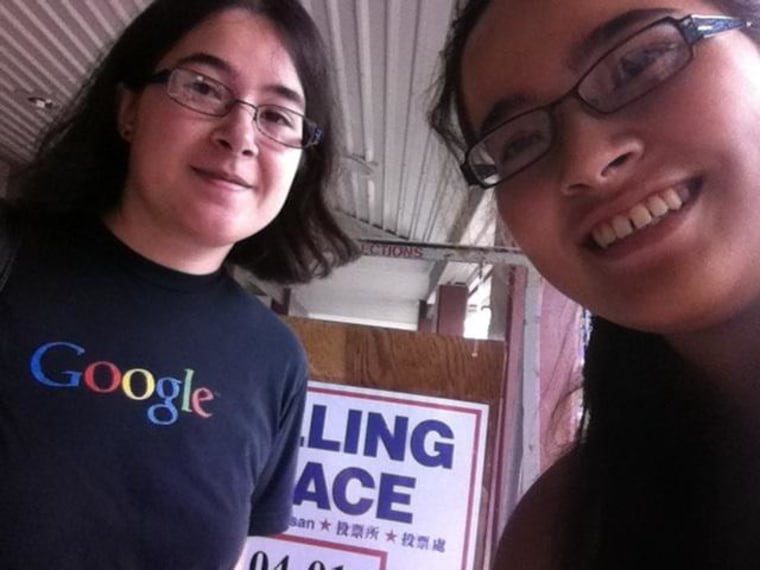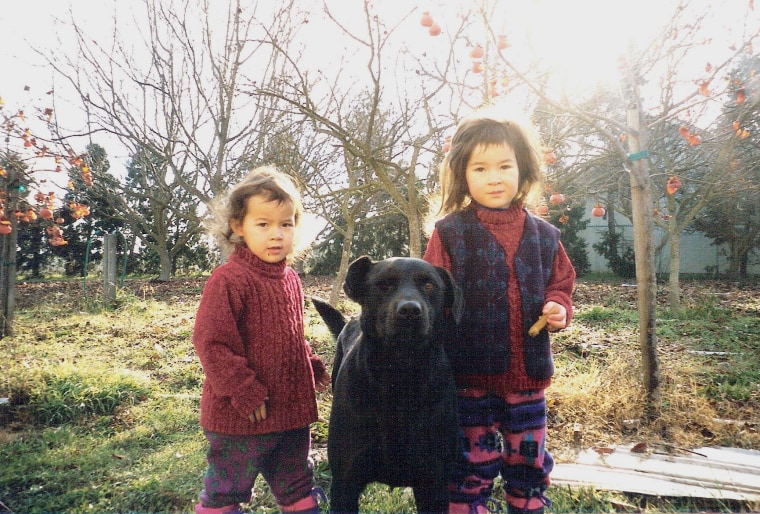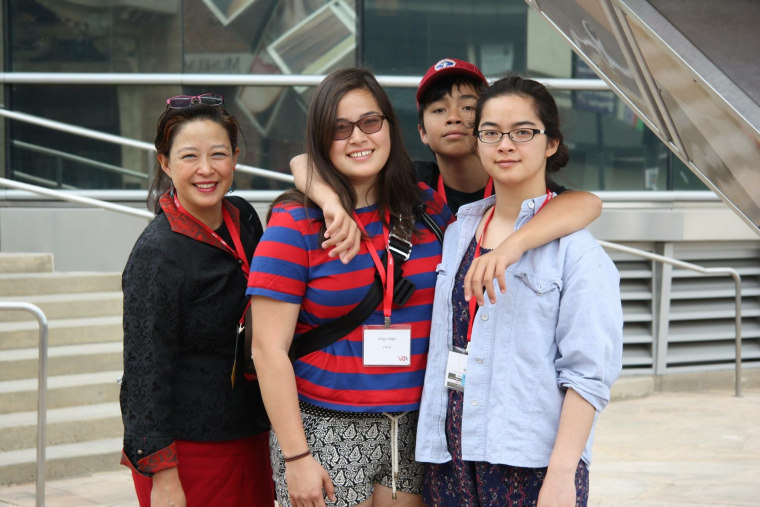My 12-year-old boy, who we all call Little Brother, comes downstairs, visibly upset. He tells me that he is disappointed in himself, that he feels bad about how he behaved. This is a boy who is all heart and kindness, and he has obviously been thinking about this for a while, so I stop what I am doing to go sit with him on the stairs.
“Now I know what discrimination looks like!” Little Brother tells me. “I’ve heard stories before, but now I’ve seen it.”
Two days earlier, we were at the Detroit airport early in the morning at baggage claim, trying to figure out where we were supposed to go. We passed a dark-haired Latino man struggling to make himself understood to two white police officers. I instinctively stop and stare — not too close, because I do not know what is going on, but close enough to aggressively eavesdrop. If my phone had any memory at all, I would be videotaping.
"I want to protect my children, to change the world so they do not have to deal with the same things that I did while growing up, meanwhile giving them the tools they will need to stand up for themselves."
My little boy, realizing that I had fallen behind, came back and dragged me to baggage carousel #1, then over to the baggage claim monitors, then across to baggage carousel #3. Each time we passed the three men, I stopped and stared again, wishing I spoke Spanish, wishing I could help, ready to provide witness in case things go wrong. Each time, my boy nervously pulled me away, even as I reassured him and encouraged him to go ahead without me.
Little Brother and I overheard one of the police officers, easily twice the size of the man being questioned, say in a harsh tone, “I’ll bet he’s an illegal.”
After we picked up our luggage and the police went away, I returned to the man to ask if he is OK. He is visibly frustrated, some sort of citation in his hand. “It’s just because my English is not good,” he told us as he put all his documentation back into his bag.
In a major airport full of people, we were the only ones to stop.
In the two days since, I have completely forgotten about it, busy with teaching and writing and children. My sweet 6th grade boy, however, has been thinking.
He is confused by what we witnessed. “Police are supposed to help people,” he tells me. “And that police man was so mean! The way he said, ‘I’ll bet he’s an illegal.’”
My boy thinks I am such a hero for wanting to try to help somehow — which I quickly disavow — and he sees the difference I make just talking to the man afterwards. He feels guilty for trying to pull me away, for feeling afraid, for worrying about my safety.
So with a big hug, we sit on the stairs together and I tell him that it is OK to feel afraid, that fear in that sort of situation is totally normal. I was afraid, too, which is why I did not get too close. And since he is only 12 years old and in 6th grade, I certainly do not want him to get involved in anything like that, unless it is at school or with his friends.

Then I tell him the many ways that I am protected, that he is protected, too. I am a U.S. citizen. I speak English. I am educated. I am a journalist. I know what the laws are. I know what my rights are. I have friends who are lawyers and elected officials. I know a LOT of civil rights activists. We are not rich, but I have a little money saved in the bank. I teach at the university (albeit as an adjunct lecturer, but it sounds good when one needs to appear respectable). Even his sudden tallness is a kind of privilege in certain circumstances.
Worst case scenario, if I ever get arrested or if he ever gets into any kind of legal trouble — just call Uncle Roland. Uncle Roland is an attorney and will know what to do.
However, with great privilege comes great responsibility. (Aren’t we all latent superheroes? Especially during Asian American and Pacific Islander Heritage Month?)
No money for babysitters, I have always taken my children with me wherever I go — lectures, poetry readings, documentaries, cultural performances, community meetings — and along the way, they happen to be exposed to a lot of amazing art, artists, academics, and activists. (Good food, too — the best part.)
It is fun to have them with me. My children have folded paper airplanes with playwright David Henry Hwang, taken actor Hudson Yang and his brother snorkeling, eaten tsukemen ramen with bloggers Angry Asian Man and JozJozJoz, drawn Pokemon with MC DANakaDAN, taken selfies with Sikh Captain America and #GoodMuslimBadMuslim, and watched “Who Killed Vincent Chin?” and “Vincent Who?” more times than they can count.
(The children and I joke about that moment that will invariably come one day when a college Asian American Studies professor will ask the class, “Who knows who Vincent Chin is?” and not only will they be the only ones to raise a hand, they will then be able to hold forth at length with more details about the case than even the professor knows. They will then have to embarrassingly confess whose child they are. And then the professor will turn out to be a friend of mine.)
Ever since the day after September 11, 2001, I have taught my children the importance of watching out for their friends and standing up for their friends. Because they can. As my children grow older and learn more about other cultures, religions, and histories, they make more and more different kinds of friends, and their circle of concern naturally widens with experience.
But I sometimes feel sad about some of what my children know.
What was I doing when I was 12? Getting in trouble for being "uppity" when I was just politely agreeing with an adult’s self-deprecating joke (about being fat). Unsuccessfully looking up words in my parents’ “Dictionary of American Slang,” published in 1965. Reading Erma Bombeck and Ann Landers to figure out the nuances of American culture and the things people hold against you for doing wrong while smiling politely at you (Which fork? No white pants or white shoes before Memorial Day and after Labor Day? It is wrong to pick up pennies?).
I certainly did not know anything when I was 12.
Or 22. Or 32.
(The children remind me that I still do not know anything and am completely innocent and naïve.)
My father once came to me in panic after taking my daughters and his dog for a walk. Hao Hao, almost three at the time, had bent over to take a good look and then declared, “[The dog] has a penis. That means he’s a boy.” My father, the epitome of conservative and traditional and engineer, was shocked and concerned how she could even know such a bad word. I explained that the children learned to use the correct terminology in preschool and that that is the best way to protect them because although they do not know it, in case they should ever be sexually abused, they will have the language to be able to testify in court about what happened.

I was never taught that language, or the language of race and rights, power and privilege. Or even the language of middle school. Until recent years, I often second guessed myself — “Is that really racist? Am I overreacting? Am I really feeling what I think I’m feeling?” — because that is what “everyone” in the mainstream always says. And I internalize.
I confess that my motivations are completely selfish. I want to protect my children, to change the world so they do not have to deal with the same things that I did while growing up, meanwhile giving them the tools they will need to stand up for themselves.
So I was heartened when I watched President Barack Obama speak at the Asian Pacific American Institute of Congressional Studies (APAICS) gala recently on video. He commended the Asian American and Pacific Islander community for standing up for Muslim, Sikh, Arab, and South Asian American communities. He got a huge, wonky round of applause for data disaggregation.
“Ultimately our job is not just to fight for our own rights but to fight for the rights of all people, everywhere,” Obama said. “That’s our job. To exercise our most precious inheritance of citizenship. And that means we have to be well-informed, we have to engage with our government, and we have to vote.”
That’s our job.
And as I tell my children, remember to always use your superpowers for good, never evil.
Follow NBC Asian America on Facebook, Twitter, Instagram, and Tumblr.
RELATED
